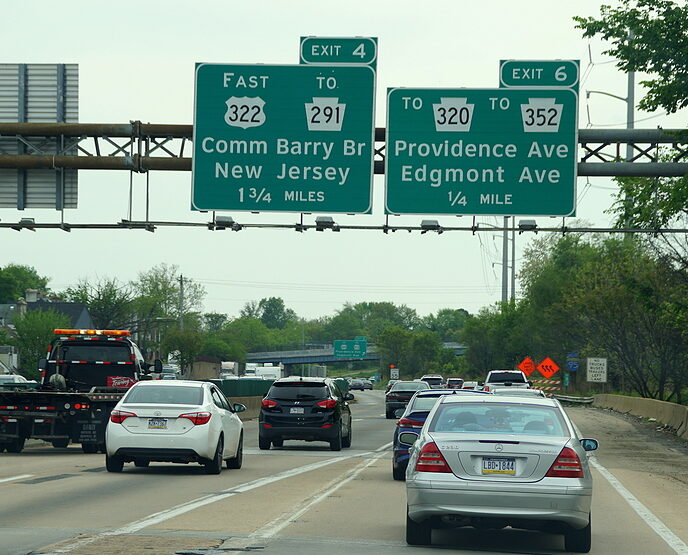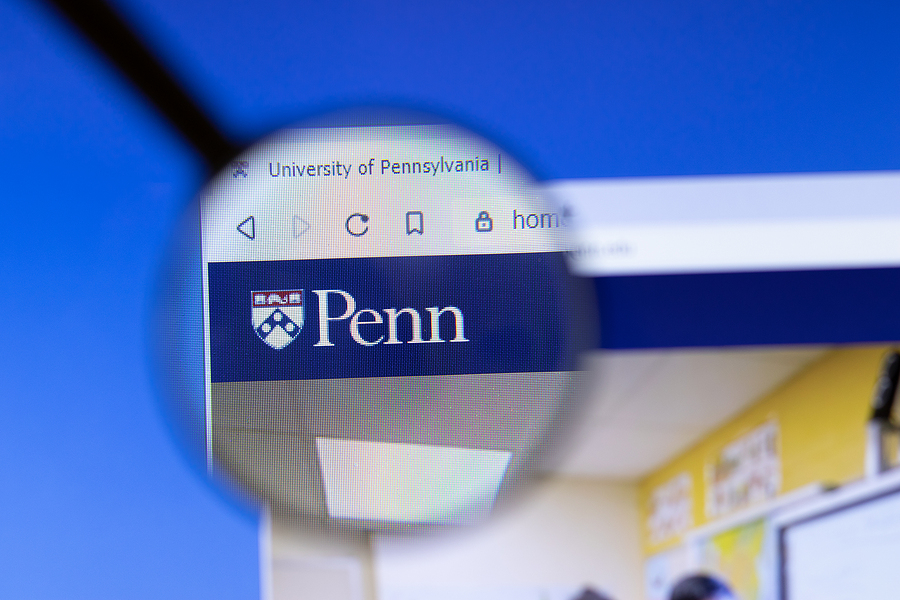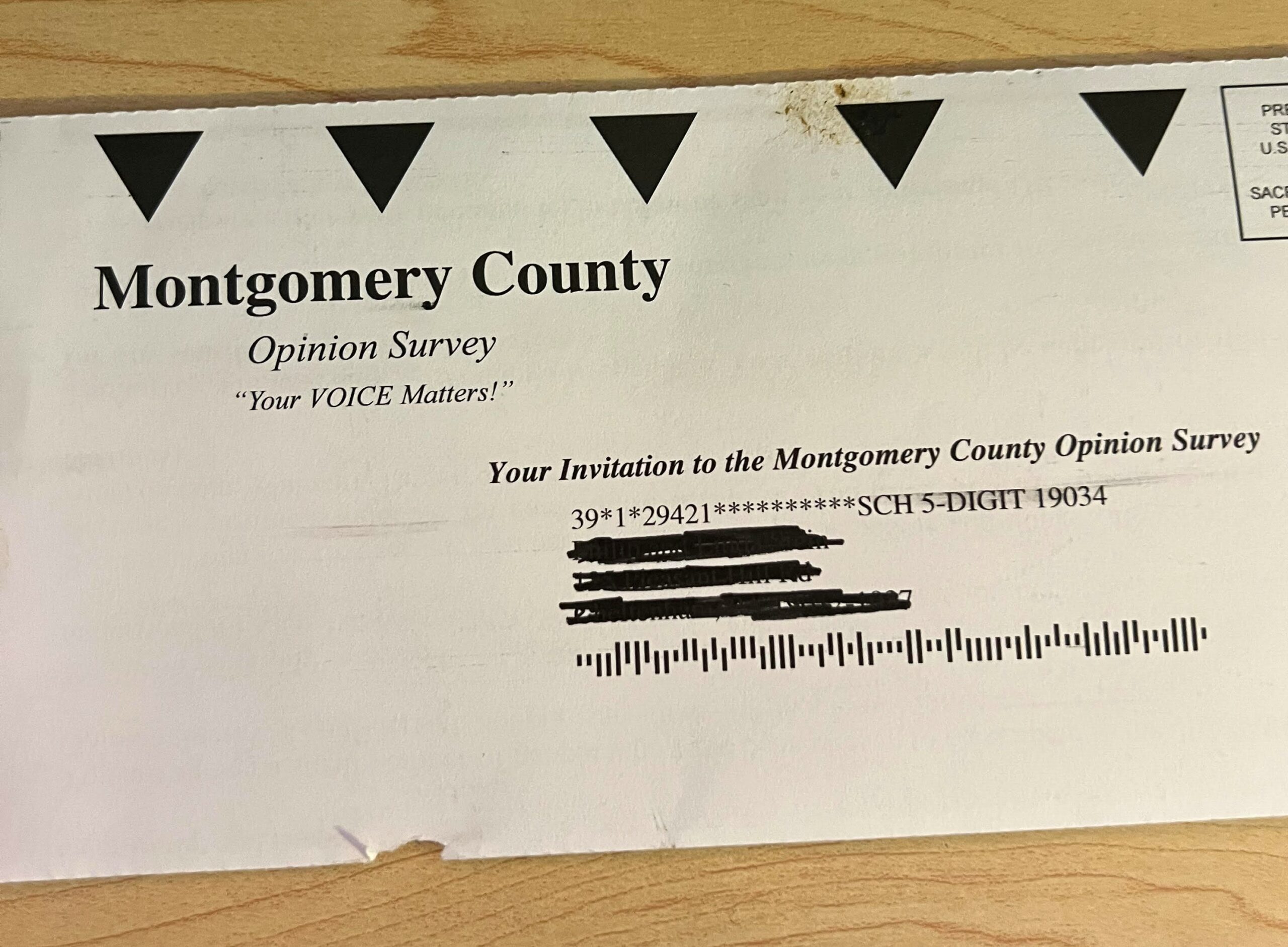Philly Fans Ranked 21st in NFL? You Gotta Be Kidding!
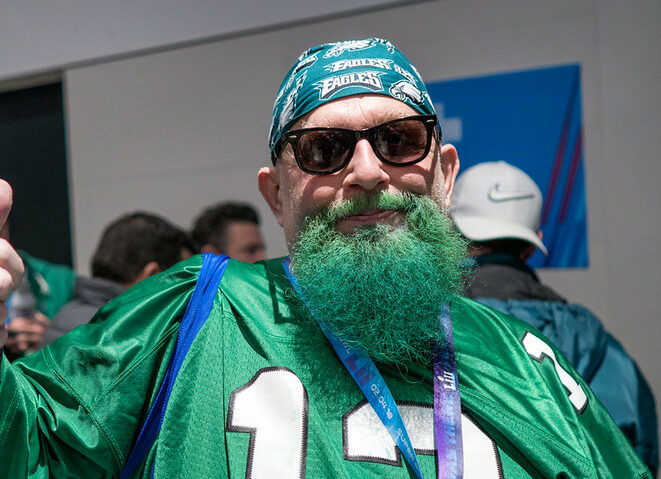
Eagles fans are throwing a flag on a new study that claims to show Pittsburgh has America’s best pro football fans, while Philadelphia ranks 21st — behind Las Vegas, who have hosted the Raiders for less time than Joe Biden has spent as president.
Say, what?
The analysis is from WalletHub.com, which looked at measurements like attendance, ticket prices, and how much social media traffic teams generated. Pittsburgh sits atop the list, followed by Green Bay and Dallas. Kansas City, whose Chiefs will face the Eagles on Sunday in Super Bowl LVII, is seventh.
Whatever their calculation, Philly fans in the Delaware Valley say they fumbled it.
“I have been going to Eagles games since 1973 when my father got season tickets for the family,” said Christine Flowers, a local lawyer and frequent contributor to DVJournal. “Our seats were two rows down from the legendary 700 Section, and I have memories of drunken men rolling down the seats into my lap. (They were Eagles fans, so it was okay. It would have been a different matter if they rooted for Dallas).
“I have gone to Wing Bowls, frozen my digits off at Monday Night Games in December, dyed my hair green-on purpose — and offered my hypothetical firstborn to the gods of football in hopes of a Super Bowl win. Fortunately, it became unnecessary. And I am by no means the craziest fan around. ”
State Sen. Frank Farry (R-Bucks) agreed.
“You can’t deny that Philadelphia has some of the most passionate and loyal sports fans around. We were fortunate enough to experience it just a few months ago when the Phillies were in the World Series. It was electric. You can feel that energy and excitement again leading up to the Super Bowl. It’s a great time to be a Philadelphia sports fan,” Farry said.
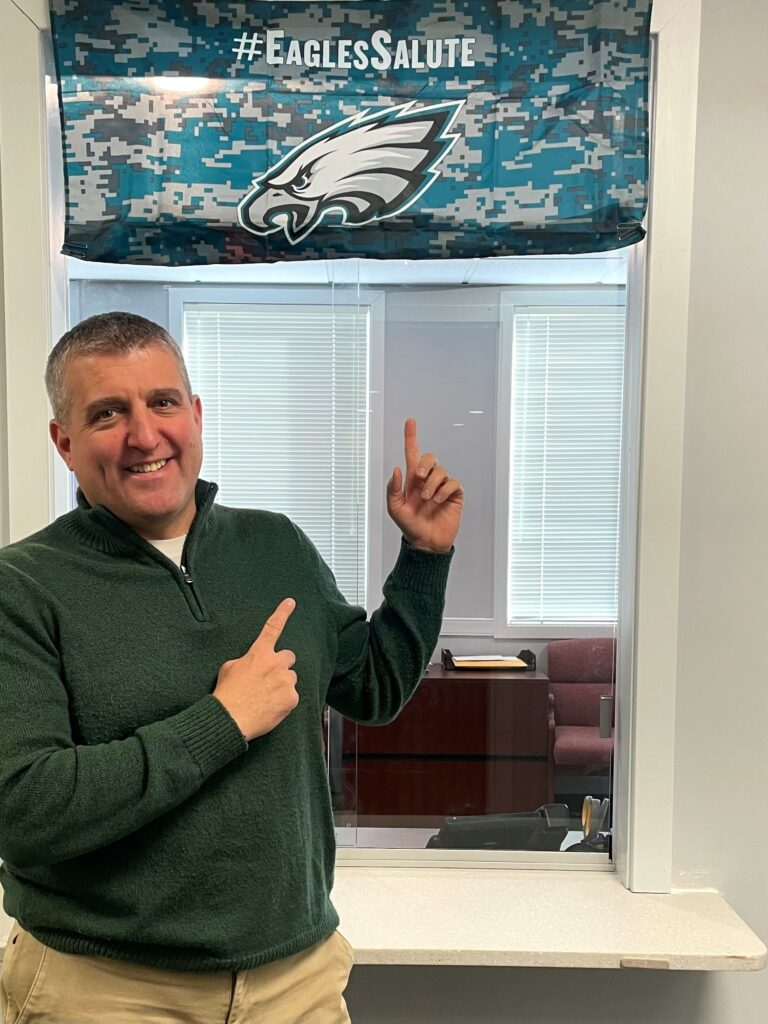
Sen. Frank Farry in his district office in Bucks County, PA.
Eagles fans argue their passions run deep, forged by years of die-hard support for a team that often didn’t deliver on the field.
Paul Rhodes grew up in Horsham in Montgomery County rooting for some mediocre (to put it kindly) Eagles teams. He has lived in Arizona for 44 years, but his understanding of the mindset of Eagles devotees remains.
“We grew up in a blue-collar city,” Rhodes said. “We didn’t have much to be proud of. The Eagles were terrible. But, we were at the games. It was a badge of honor.”
Rhodes compares Eagles fans to those in Green Bay, another city with a passionate fan base.
“Green Bay fans are tremendously loyal,” he said. “They are a blue-collar town of 110,000 people. They bleed green.
“We are from a blue-collar town. Most people don’t move more than 50 miles away from the town they grew up in. They are proud of their team, good, bad, or indifferent.”
Ukee Washington has been at KYW-TV for 36 years. The Dover, Del. native has a deep understanding of Philadelphia sports’ mindset fans in general and Eagles fans in particular.
“Eagles Nation is second to none in my opinion,” he said. “We are a proud, passionate group, and that enthusiasm begins at birth.”
Like Rhodes, Washington cited the blue-collar mindset of the Eagles’ fan base.
“Philadelphia is a hardworking blue-collar town that expects our teams to work extremely hard,” he said, “With no excuses and owning up to the tough times, while at the same time learning from mistakes to make it better.”
Washington acknowledged that from time to time the passion of Eagles fans boils over.
“The passion and knowledge (of fans) can at times seem intimidating,” he said, “with a few fans on occasion maybe going overboard a bit, but it’s all part of the psychological warfare that’s part of the game.
“That’s the vibe of being a true fan. We absolutely love our teams and would go through a brick wall for all of them.”
If anything, Eagles fans have a reputation for being too passionate. In fact, those passions — on ugly display at a Monday Night Football game in 1997 — led to the creation of “Eagles Court.” A jail, a courtroom, and a judge, all open and on hand at Veterans Stadium at game time.
Montgomery County resident Phil Gianficaro doesn’t dispute that Eagles fans love their team. But he said outsiders find the self-regard of the team’s local supporters a bit galling.
“What (fans in other cities) don’t buy is Eagles fans’ insistence that their passion is unequaled anywhere in the NFL, and insisting otherwise calls into question one’s intelligence. Go to Kansas City. Go to Seattle. They are insanely crazy about their teams,” Gianficaro said.
And at least one Chiefs fan says Eagle supporters aren’t the out-of-control maniacs of the stereotype. Heather Whitten lives in upstate New York but is a diehard Chiefs supporter. In 2021 she attended a Chiefs-Eagles game at Lincoln Financial Field attired in Chiefs gear. She says that other than some good-natured teasing she had no problems with the Eagles fans. (Then again, her Chiefs won 42-30.)
“In my experience, Eagles fans get a bad rap,” Whitten said.
Flowers was adamant, however, that when it comes to loyalty, passion, and commitment, Bleeding Green Nation is in a league of its own.
“Anyone who thinks that the Eagles fans are not head and feathers above any other sports creature, including the Steelers, is as crazy as the guy who hired Chip Kelly as head coach.”
Charlie O’Neill, a local GOP consultant, blamed “anti-Philly bias.”
“But like the song says, ‘No one likes us, we don’t care.'”
Please follow DVJournal on social media: Twitter@DVJournal or Facebook.com/DelawareValleyJournal

